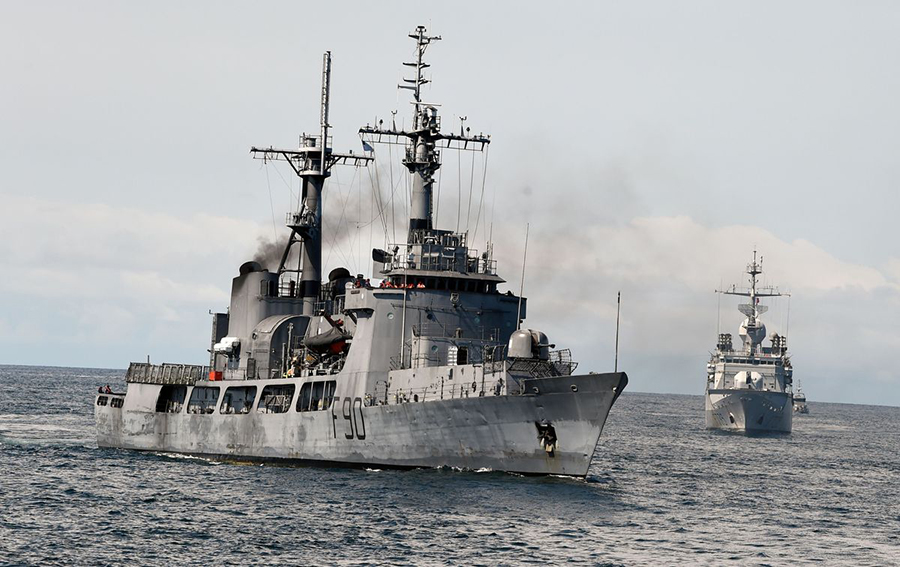Following frequent attacks on vessels and kidnapping of seafarers, the Gulf of Guinea was in 2021 described as the world’s piracy hotspot.
In its quarterly report on maritime piracy, The International Maritime Bureau (IMB) declared that the Gulf of Guinea remains dangerous for seafarers, accounting for nearly half of all reported piracy incidents in the first quarter.
Timeline of recent attacks on seafarers by pirates
- April 19, 2020: The Portuguese-flagged cargo ship Tommi Ritscher was attacked by pirates off the coast of Cotonou, Benin. The Bulgarian captain and seven other sailors were kidnapped. The captain was freed on May 25.
- December 2020: Danish Shipping Company, Maersk was attacked off the West African coast by ‘criminals’ while travelling from Tema in Ghana to Kribi in Cameroon.
- January 2021: Maersk, the world’s largest shipping company, called for military intervention in the piracy problem in the Gulf of Guinea, which had made the gulf the new global headquarters for piracy
- January 2021: According to the International Maritime Bureau in its 2020 Annual Piracy report, West Africa’s Gulf of Guinea recorded an unprecedented increase in piracy attacks in 2020.
- The IMB reported that 135 crew members were kidnapped from their vessels in 2020, with the Gulf of Guinea accounting for over 95% kidnapped. A record of 130 crew members were kidnapped in 22 separate incidents.
- January 23, 2021: The Liberia-flagged container ship V/S Mozart was attacked by pirates in the Gulf of Guinea. There were 19 crewmembers in the vessel, 1 killed, 15 kidnapped. The ship arrived at Port-Gentil at Gabon at 11:00 TRT with 3 remaining crew members.
- Also in January 2021, a Turkish ship was attacked off Nigeria’s Gulf of Guinea coast, killing an Azerbaijani citizen, and kidnapping 15 sailors. The Liberian flagged ship was on its way to Cape Town from Lagos, attacked 160 kilometres off Sao Tome.
- November 25, 2021: The Royal Danish Navy frigate HDMS Esbern Snare intercepted a skiff that was heading towards several merchant ships. The pirates opened fire on a RHIB carrying members of the Frogman Corps, who returned fire, killing four pirates. None of the Danes was injured, but their RHIB was hit. Four surviving pirates were detained and taken aboard HDMS Esbern Snare. The incident took place 25–30 nautical miles (46–56 km; 29–35 mi) south of the territorial boundary of Nigeria.
Declining incidents of piracy in the region
Major International shipping companies announced they were drafting a policy towards dealing with piracy and maritime risks in the world’s most dangerous ocean trade routes including the Gulf of Guinea. BIMCO, one of the world’s largest associations of shipping companies, stated that the Gulf of Guinea is the biggest piracy headache vessels face.
But according to a report released in July 2021, piracy in the Gulf of Guinea fell to its lowest since Q2 2019, in the last quarter. IMB’s Piracy Reporting Centre (PRC) reported the region led globally with 32% of all reported incidents and accounted for all 50 kidnapped crew and the single crew fatality recorded during the first half of 2021.
In October 2021, the International Maritime Bureau (IBM) reported that global piracy cases dropped to the lowest level since 1994. Gulf of Guinea region recorded 28 incidents of piracy and armed robbery in the first nine months of 2021, in comparison to 46 for the same period in 2020, with the Nigerian area recording only 4 related cases for the same period.
Efforts made by the Nigerian government and stakeholders
The reduction in violent activities on Nigeria’s coast was a collaborative effort, spearheaded by the Nigerian Maritime Administration and Safety Agency (NIMASA) and the Nigerian Navy’s Deep Blue Project which saw the injection of funds to buy gear needed to fight piracy and also a collaboration with the U.S and Danish Navy.
In July 2021, a Federal High Court in Lagos convicted 10 men under a new law designed to combat the rising piracy in the Gulf of Guinea. The suspects were handed 12-year prison sentences after they were captured in May 2020 during a forceful boarding of a Chinese fishing vessel off the Ivorian coastline and kidnapping the crew member.
NIMASA’s Chief, Dr Bashir Jamoh attributed the positive development to the bringing together of maritime response authorities through initiatives like Nigeria’s Deep Blue Project and Gulf of Guinea Maritime Collaboration Forum which will continue to strengthen knowledge sharing channels and reduce risk to seafarers in the region.
NIMASA also introduced new measures to check security threats in the Nigerian maritime industry, as ship captains operating in Nigeria are now required to submit the Security-Related Pre-Arrival Information (SRPA) forms to the agency not later than 48 hours before the ship’s arrival at any Nigerian port. All ships are also expected to maintain 24 hours vigilance and surveillance to detect strange movements, including small boats and skiffs that may not be captured by the radar.
Also, in August, US Navy ship, USS Hershel “Woody” Williams, arrived in Lagos to enable Nigeria in the fight against piracy. US Consul General, Claire Pierangelo said that the ship would be permanently assigned to Africa as a sign of the U.S government’s mission to fight piracy in the Gulf.
Bottomline
Nigeria’s efforts alongside working with its global allies greatly reduced piracy in the region as sea piracy activities at Nigeria’s Gulf of Guinea waters fell by as much as 80% in 2021, one of Nigeria’s bright spots in the fight against insecurity.
















